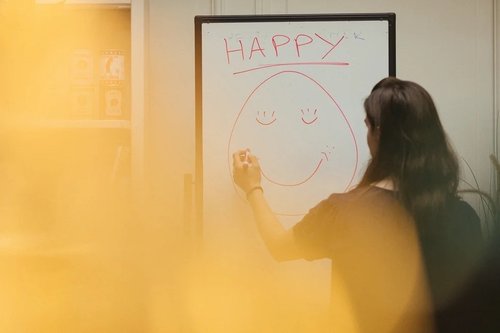What if your career has become your whole identity?
Oct 27, 2021
6 mins

HP
Journaliste freelance.
Many people define who they are by what they do for a living. So what happens to their sense of identity when they lose their job? Our work shapes a large part of our existence, dividing up everyday life, determining who we spend time with, feeding our thoughts and experiences, and placing us in society. So when this is brought to an abrupt halt by redundancy, burnout, or a sudden loss of purpose, some people don’t know who they are anymore. As the United States continues to reel from the “Great Resignation,” a psychological concept from the 1970s that describes this feeling has made a comeback: “enmeshment.” On both sides of the Atlantic, psychologists have been helping their clients to deal with this identity issue for several years. We spoke to sufferers and psychologists to find out more.
“Six months ago, we wouldn’t be having this conversation.” The voice on the other end of the phone sounds surprised at what she is saying: “I’d stopped answering the phone when I saw a number I didn’t recognize.” Camille used to be confident in her role, which involved calling clients until she reached a crisis point at work. So she resigned from her job as she felt like she needed to find herself again even though she had no idea what she was going to do next. “At that time, the mere idea that someone might ask me what I was doing made me anxious,” she said.
Ever since graduation, Camille had followed a clear path. After seven years in a Parisian start-up, the 20-year-old joined a recruitment agency and was promoted to account manager at the beginning of 2020. She was well-paid, she hung out with work friends almost every day and her career prospects were good. But the following spring, Covid-19 brought it all to a sudden end. She used to look forward to “going out to meet and support clients.” Now she was stuck at home making 50 calls a day to companies that were laying off employees left and right. She lost all enthusiasm for her work, just wanting to be left alone. During the course of those days, which often ran from 8.30 AM to 7.30 PM, Camille started to question what she was doing with her life. She wasn’t sure she belonged in this “shark-like” professional environment. She now has the kind of hindsight you get from hitting the reset button on life having since resigned, ended a relationship, and moved back in with her parents. Camille said: “I was stuck doing something that just wasn’t me. I kind of lost myself. Instead of being natural, I was always monitoring my own behavior. I felt I’d become a different person.”
All work and no play
Azimuth, a psychology practice based in Boston, works with clients like Camille who have sacrificed part of their personality for their work. Founder Dr. Janna Koretz uses the term “enmeshment” – taken from family psychology – to describe this phenomenon affecting a great number of professionals in high-pressure careers. In the field of marriage and family therapy, it refers to relationships where a lack of personal boundaries makes it hard for people, especially children, to develop their own independent identities. Applied to the professional sphere, it refers to professionals whose lives get tangled up in their careers. Loss of a job or interest in a job can cause them to doubt their own identity. According to Koretz, “Not liking your job is one thing – but what happens when you identify with it so much that hating your job is like hating yourself?”
In France, Hélène describes how she felt at her lowest point. “I was a wreck. I’d lost all sense of self,” she said. Unlike Camille, and the four million Americans who have voluntarily left their jobs since the start of the pandemic in what has been called the Great Resignation, the 30-year-old’s identity crisis wasn’t caused by the lockdown. One year working as a digital project manager for a communications agency under a bullying manager had taken its toll. The experience shattered her professional illusions and expectations, and her health suffered due to all the sleepless nights. Hélène said, “I was losing my sense of identity. I kept asking myself questions like, Have I made the right choices? What the hell am I doing? Who am I?”
Jean-Denis Budin has experience in helping professionals with this issue at Credir, a French training center that specializes in treating and preventing burnout. “The problem is that by the time exhausted people ask themselves these questions, their brains are too tired to give a clear answer and their perspective on things is distorted,” he said. Budin prefers the term “over-commitment” to “enmeshment” and identifies two distinct phases for the former. First, there’s the short term. When a professional goal is within reach, people sacrifice everything and “sometimes wreak havoc in their life” for their cause. This only lasts a short while. Once the deadline has been met, life slows down to its regular pace. In the medium term, meeting deadlines becomes the norm, and individuals “lock themselves into a small professional prison,” he said.
Catherine Vasey is a psychologist specializing in burnout, the founder of Noburnout and author of Comment Rester Vivant au Travail(How to Stay Alive at Work). She describes how easy it is to become enmeshed. “Without realizing it, you can disappear into your professional life. You over-invest in it, work overtime, have no time or energy for your private life, and have no space for friends and family. Everything outside of work falls away,” she said. As your personal life vanishes, it leads to a major psychological imbalance. Budin uses the “three lives” theory to explain what happens in this situation. To thrive, people need three lives: professional, personal (family and close friends), and extra-professional hobbies. He uses a simple image to illustrate his theory. “It’s like a three-legged stool. If you take one leg off, it’s going to be unstable,” he said. “But if you take a second leg off, you have to be hyper-vigilant so that it doesn’t fall over. And you won’t last long like that.”
Busting the ‘dream job’ myth
From the city of Harvard and MIT, Koretz recounts how people in high-pressure and high-paying jobs have a greater tendency to focus only on what advances their careers and to seek fulfillment through work alone. The culture of success that dominates their professional world and the socioeconomic status of their position encourage them towards this slippery slope. In addition to these high-risk occupations, there are also “vocations” – jobs that are meaningful and where their role in society is clear.
Vincent used to have a job at a charity working to reduce poverty. When his contract ended in 2019, the loss of purpose plunged him into a “bottomless existential crisis.” “I was used to seeing myself – and being seen by others – as useful,” he said. Being an anti-poverty activist was also good for his social life. He got invited to lively political debates and trendy underground events. “It’s not like I was rejected when I lost my job, but it made me feel a lot less interesting and needed. Vincent also felt he lost credibility and now lacked the legitimacy to join heated debates. Although burnout can strike at any age, a study by the Illinois psychiatric center Yellowbrick reveals that almost 70% of millennial respondents defined their identity through work. For Vasey, this comes as no surprise. “In today’s society, ‘What do you do for a living?’ is the first question people ask when they want to get to know you better. Nobody ever asks, ‘What do you enjoy doing?’ or ‘What’s important to you?’,” she said.
“What would it take for me to be able to need to say, at this ripe old age, that I’ve had a good life? Nobody answers that question with, ‘I’ve had a successful career’ or ‘I finally finished the work I was supposed to do.’ … A job can be fulfilling, but it’s not going to make you happy.” – Catherine Vasey, psychologist
Untangling the confusion between fulfillment and happiness is a big part of the work Azimuth does with its clients. Koretz provides a values navigator table on the website to rank categories such as romantic relationships, spirituality or work in order of importance and compare the results with the real place these values have in your life today. Vasey, the Swiss psychologist, offers visualization exercises to clients consumed by their professional lives. She invites them to imagine themselves as centenarians standing on top of a mountain with a clear horizon and to ask themselves: “What would it take for me to be able to say, at this ripe old age, that I’ve had a good life?” Vasey said. “Nobody answers that question with: ‘I’ve had a successful career’ or ‘I finally finished the work I was supposed to do.’ And that’s because the whole myth of the ‘dream job’ is starting to fall apart. A job can be fulfilling, but it’s not going to make you happy.”
After getting support from a career coach and changing her way of thinking, Camille got back to searching for a job, but with a better understanding of what inspires her. Hélène and Vincent, meanwhile, continue to wonder to themselves, “What the hell am I doing here?” But when someone else asks either of them what they do “for a living,” they no longer respond with a job title. Depending on their mood, they respond with “living life,” “trying to save the world” or “doing my best.” They sometimes even answer with a question to show they’re interested in other people too.
The name has been changed
Translated by: Andrea Schwam
Photo: Welcome to the Jungle
Follow Welcome to the Jungle on Facebook, LinkedIn, and Instagram, and subscribe to our newsletter to get our latest articles every day!

More inspiration: Our relationship with work

Advice for people pleasers: Breaking free from being “too nice” at work
Do you often say things like, "Yeah, sure, I can do that!" when in fact you don't have the bandwidth to do that? We've got you.
Dec 12, 2024

There’s no place like home: Does relocation hurt productivity?
Relocating often brings homesickness, but it’s part of the journey. Here’s how to embrace the change and make the most of it.
Oct 22, 2024

Should you take your office crush to the next level?
Is an office crush worth the risk, or more damaging to your career and reputation than you think?
Oct 09, 2024

Young workers on unpaid internships: Was it worth it?
While internships build skills and connections, unpaid ones can limit opportunities for those who can't work for free. Is it fair?
Sep 12, 2024

Sleeping less to succeed more: Do CEOs sleep as little as we think?
In today's fast-paced corporate world, a common belief is that successful leaders, particularly CEOs, need less sleep to achieve their goals.
Aug 26, 2024
The newsletter that does the job
Want to keep up with the latest articles? Twice a week you can receive stories, jobs, and tips in your inbox.

Looking for your next job?
Over 200,000 people have found a job with Welcome to the Jungle.
Explore jobs